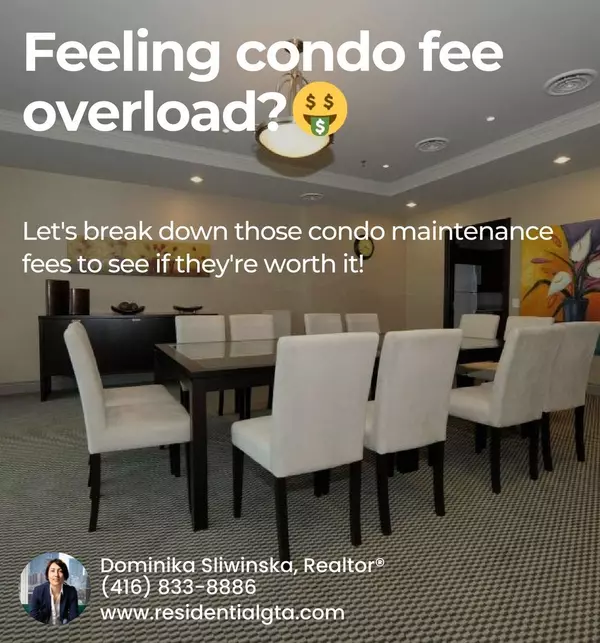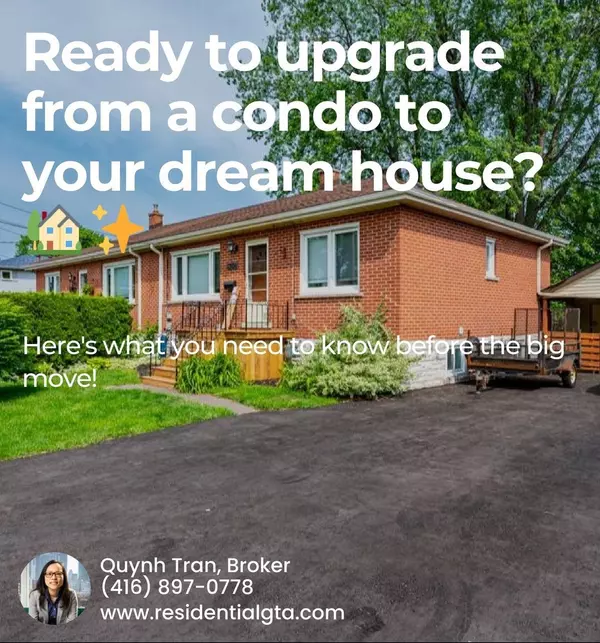Timing the Market: How to Make the Best Buying and Selling Decisions Simultaneously
Moving from a condo in Toronto to a house in the suburbs is a big step for many couples. One of the most common questions they face is whether to sell their current condo before buying a new house or to buy the house first and then sell the condo. This blog will guide you through making the best decision by exploring the pros and cons of each option, providing case studies, and examining both the financial and emotional impacts.
Should You Sell Before You Buy? The Ultimate Guide to Making the Right Move
When considering whether to sell your condo before buying a house, it's essential to weigh the pros and cons carefully.
Pros of Selling Before Buying:
1. Financial Clarity: Selling your condo first gives you a clear understanding of how much money you can spend on a new house. You won't be left guessing or overextending your budget.
2. No Double Payments: There's no need to worry about paying two mortgages at the same time. This can ease financial stress significantly.
3. Less Pressure: Without the pressure to purchase immediately, you can take your time to find the perfect house in the suburbs that suits your needs and lifestyle.
Cons of Selling Before Buying:
1. Temporary Accommodation: You may need temporary housing if you sell your condo before finding a new house. This could mean additional moving expenses and the hassle of relocating twice.
2. Market Changes: Real estate markets can fluctuate. The market conditions may change between the time you sell your condo and when you buy your new home, possibly affecting prices.
Steps to Sell Before You Buy:
1. Evaluate Your Condo’s Market Value: Get a professional appraisal or speak to a real estate agent to understand how much you can expect to sell your condo for.
2. Prepare Your Condo for Sale: Declutter, clean, and make necessary repairs to increase your condo's appeal to buyers.
3. List and Market Your Condo: Work with a real estate agent to list your condo and reach potential buyers through various marketing platforms.
4. Negotiate and Close the Sale: Once you receive offers, negotiate the terms and close the sale. Make sure to plan your temporary living arrangements in advance.
5. Start House Hunting: With the proceeds from your condo sale, begin your search for the perfect house in the suburbs.
Buying First vs. Selling First: Case Studies from Industry Experts
Examining real-life scenarios can help couples make informed decisions. Let's look at two case studies:
Case Study 1: Buying First
The Situation: Sarah and John wanted to move from their downtown condo to a house in the suburbs. They decided to buy a new house first to ensure they had the perfect home.
What Happened: They found a lovely house and made an offer that was accepted. However, selling their condo took longer than expected, causing them to pay two mortgages for three months. Although it was financially strained, they were thrilled with their new home.
Lesson Learned: Buying first gives you the certainty of securing a home you love but can be financially demanding if your current property doesn’t sell quickly.
Case Study 2: Selling First
The Situation: Mark and Lisa opted to sell their condo before buying a new house. They wanted to avoid the pressure of managing two mortgages.
What Happened: Their condo sold within a few weeks, but it took them another two months to find a new house. They had to live with family temporarily, which was inconvenient, but they managed to buy a beautiful house with a clear understanding of their budget.
Lesson Learned: Selling first can provide financial peace of mind but may require temporary living arrangements, which can be inconvenient.
The Financial and Emotional Impacts of Buying Before Selling
Deciding the order of selling and buying involves both financial and emotional aspects. Here's what you need to consider:
Financial Impact:
1. Mortgage Considerations: If you buy first, you might need a bridge loan or have to qualify for two mortgages simultaneously. Ensure you speak with your mortgage advisor to understand your options.
2. Cash Flow Management: Selling first means you'll have the cash from your condo sale, making it easier to manage your finances when buying a new house.
3. Market Trends: Be aware of market trends. Situations like a buyer’s market (more homes for sale than buyers) or a seller’s market (more buyers than homes) can influence your decision effectively.
Emotional Impact:
1. Stress Levels: Managing two transactions simultaneously can be stressful. Ensure you have a reliable real estate agent to guide you through the process.
2. Sense of Security: Knowing you have sold your condo before buying can provide a sense of stability and reduce anxiety about financial obligations.
3. Decision Fatigue: The entire process of buying and selling can be emotionally draining. Take care of your mental health by planning and maintaining open communication with all parties involved.
Conclusion
Moving from a condo in Toronto to a house in the suburbs is an exciting journey. Balancing the timing of selling your condo and buying a new house requires thoughtful consideration of your financial situation and personal preferences. By understanding the pros and cons, evaluating case studies, and being mindful of both financial and emotional impacts, you can make a well-informed decision that suits your unique circumstances.
Whether you choose to sell first or buy first, having the right professional guidance can make all the difference. Collaborate with a knowledgeable real estate agent to navigate the complexities and ensure a smooth transition to your new home in the suburbs.
Categories
Recent Posts










